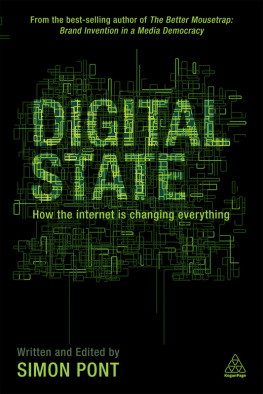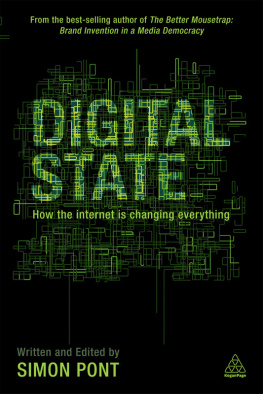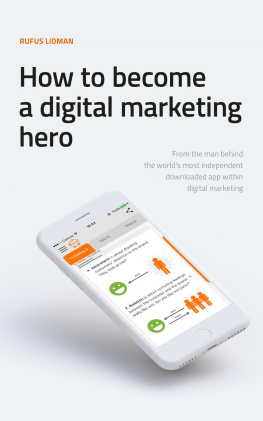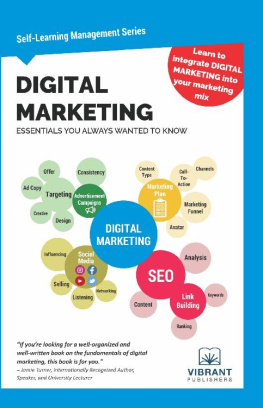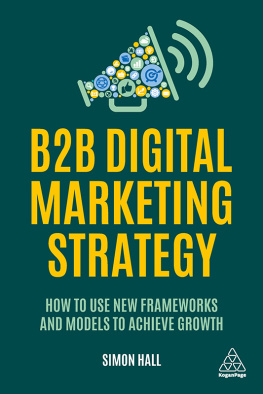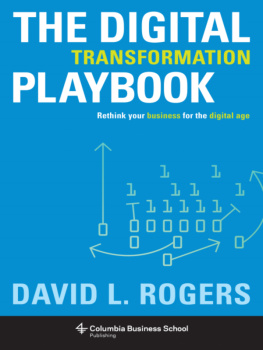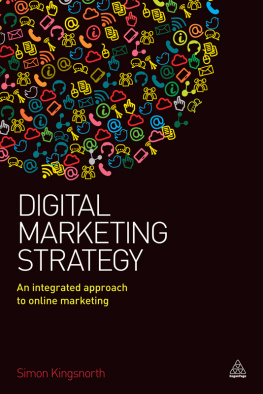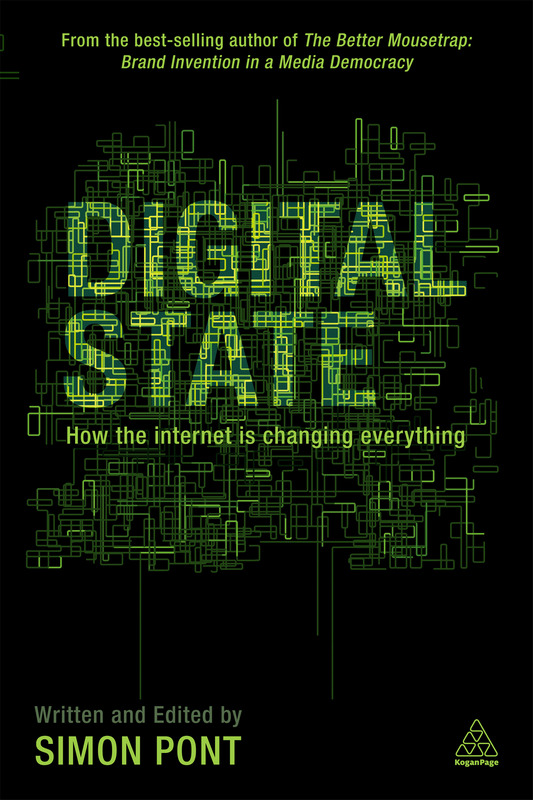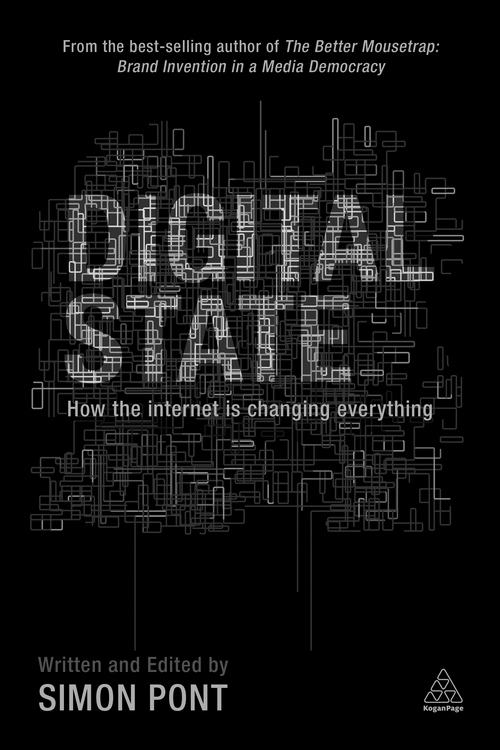Note on the Ebook Edition
For an optimal reading experience, please view largetables and figures in landscape mode. |
This ebook published in 2013 by
Kogan Page Limited
120 Pentonville Road
London N1 9JN
UK
www.koganpage.com
Simon Pont, 2013
E-ISBN 978 0 7494 6886 6
To the Digital Natives, who know no other world but this.
The future is theirs; may they be brilliant with it.
CONTENTS
SIMON PONT is a writer, commentator and brand-builder. His agency career includes being part of Saatchi & Saatchi and Naked Communications, the pioneers of communications planning. Hollywood movie studios, Icelandic investment banks, British chocolate bars and Middle Eastern airlines figure amongst his time on the inside of Adland. He is chief strategy officer at agency network Vizeum, and an EACA Effies judge. He is the author of The Better Mousetrap: Brand Invention in a Media Democracy and Remember to Breathe , a novel.
Say hello at www.simonpont.com .
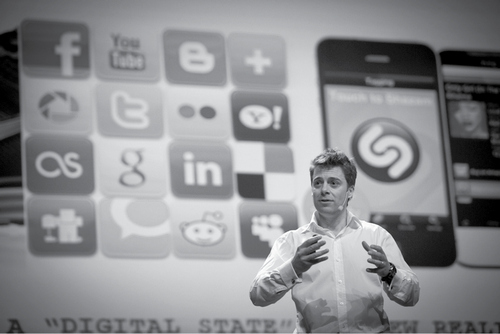
Simon Pont. Photograph by Niklas Maupoix (2013)
Like a squash ball, locked inside an all-glass court, played in a never-ending Sisyphean rally between two invisible and equally able opponents, thats what the Digital State first felt like. A descriptor in search of a winning shot, to break the deadlock, to set it free.
I had this idea, not even as much as an idea, more a part-idea, a descriptor, the Digital State, a descriptor for something quite real, or soon-to-be-real, that held real significance, an energy and direction for the way in which it feels things are going.
Like a squash ball, locked inside an all-glass court, played in a never-ending Sisyphean rally between two invisible and equally able opponents, thats what the Digital State first felt like. A descriptor in search of a winning shot, to break the deadlock, to set it free, unleashing vivid descriptions and Technicolor details.
And set to this creepy little squash match in semantic purgatory, I could hear a soundtrack. I could hear Alicia Keys singing an Empire State of Mind where the streets will inspire you the bright lights make you feel brand new where theres nothing you cant do; Put your lighters in the air, everybody say yeah, yeah.
Like I said, all a bit haunting, but captivating too. So very captivating.
The Digital State : I felt I was on to something. I felt as though Id crossed a border, entered a new frontier. And, while I had a good few ideas about the kind of streets and lights ahead, most of all I had questions.
To recycle Hartleys line on the past and point it forward, I see the future as a foreign country too, where theyll do things differently, remarkably so. And the big challenge with looking forward, with looking through a glass, is that its likely to be darkly. But lets take that step forward just the same, through the glass, through what has in fact turned out to be a screen, likely HD.
I think therell be some bright lights ahead, but, just in case, lets get our lighters ready.
SP
London
It was the best of times, it was the worst of times, it was the age of wisdom, it was the age of foolishness, it was the epoch of belief, it was the epoch of incredulity, it was the season of Light, it was the season of Darkness, it was the spring of hope, it was the winter of despair, we had everything before us, we had nothing before us
Charles Dickens, A Tale of Two Cities (1859)
The sky above the port was the color of television, tuned to a dead channel.
William Gibson, Neuromancer (1984)
No more secrets.
Sneakers (1992)
Were living the polar opposite of splendid isolation. We now celebrate the splendour of feeling and being interconnected, on the grid all of the time where its unclear whether we are imprisoning or liberating ourselves, and its likely were doing both.
F or a time British foreign policy purported that isolation was splendid. Distance from others was healthy. Maybe only an empire, at one point the largest in history, with all the arrogance that comes from presiding over one-fifth of the worlds population, could assert such a stance. Such dazzling, reach-for-your-Ray-Bans conceit or, as Cecil Rhodes once put it, To be born an Englishman is to win first prize in Gods lottery.
That was all very then. Right here, in our right now, were living the polar opposite of splendid isolation. We now celebrate the splendour of feeling and being interconnected, on the grid all of the time. We like the idea of living and being part of this world wide web, this matrix, where its unclear whether we are imprisoning or liberating ourselves, and its likely were doing both.
Our quotidian lives are feeling less commonplace because, more and more, that commonly frequented place is cyberspace, a placeless space that sits in between our physical and imagined worlds, where we can feel globally connected. Online, we are all becoming citizens of the world, gravitating towards , without by extension so quickly recoiling from whatever we are not. The online world is one of friends and likes, not of strangers and dislikes. Cyberspace is a cosmopolites haven.
Take living memory, and apply a little stretch. Give contemporary history a timeline that kicks off with the 20th century and a second Industrial Revolution in full swing, and then hurtles forwards with an ever-quickening pulse. The inventions, the achievements, the transformative technologies that race and build along the timeline, each and every one utterly life-changing. Witness: the domestic telephone; radio and television; the aeroplane; the atom bomb; the microchip; the personal computer; lasers and fibre optics; the internet
The internet: backbone of the Digital Revolution, a revolution in our time, which were living through, witnessing, being so very much part of technological change continuing to reshape society and steer the human condition. The crossover happened in 2009, when there were suddenly more digitally connected devices littering the planet than there were people. Continue the trend line, and by 2020 connected devices will outnumber people sevenfold . In a sheer aggregate sense, the machines have taken over. Our always on world has become one of gadget choice, an array of web-linked devices within arms reach, each a compass by which we continue our cyber-wanderings.
Cisco forecasts that 78 per cent of all web traffic will be video by 2016. YouTube is the most popular desktop home page for people in the UK, a site which now receives 4 billion views from somewhere on the planet every day. Every minute 72 hours of video are uploaded to YouTube (Social Media, 2013). Across 2011, YouTube received 1 trillion views. The numbers 4 billion, 1 trillion seem unreal, unrelatable, an abstraction: like Stalins view of a million deaths, a mere statistic.
In 1982, the movie Tron seemed like wonderfully absurd cartoon fiction, but I dont think its proved so absurdly off the mark. Its just that Tron s depiction of two utterly separate worlds, one physical, one digital, was very literal, too literal, and the reality, our reality , is a hybrid, where separate worlds are fusing and augmenting and this all has quite remarkable implications for what reality is starting to mean to people.

